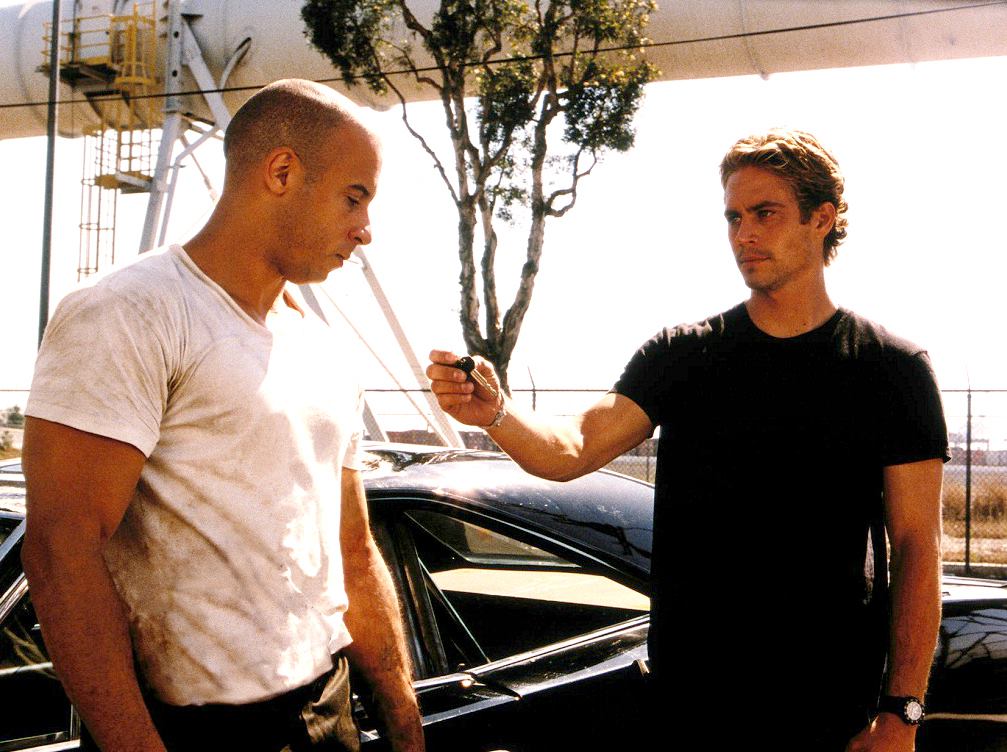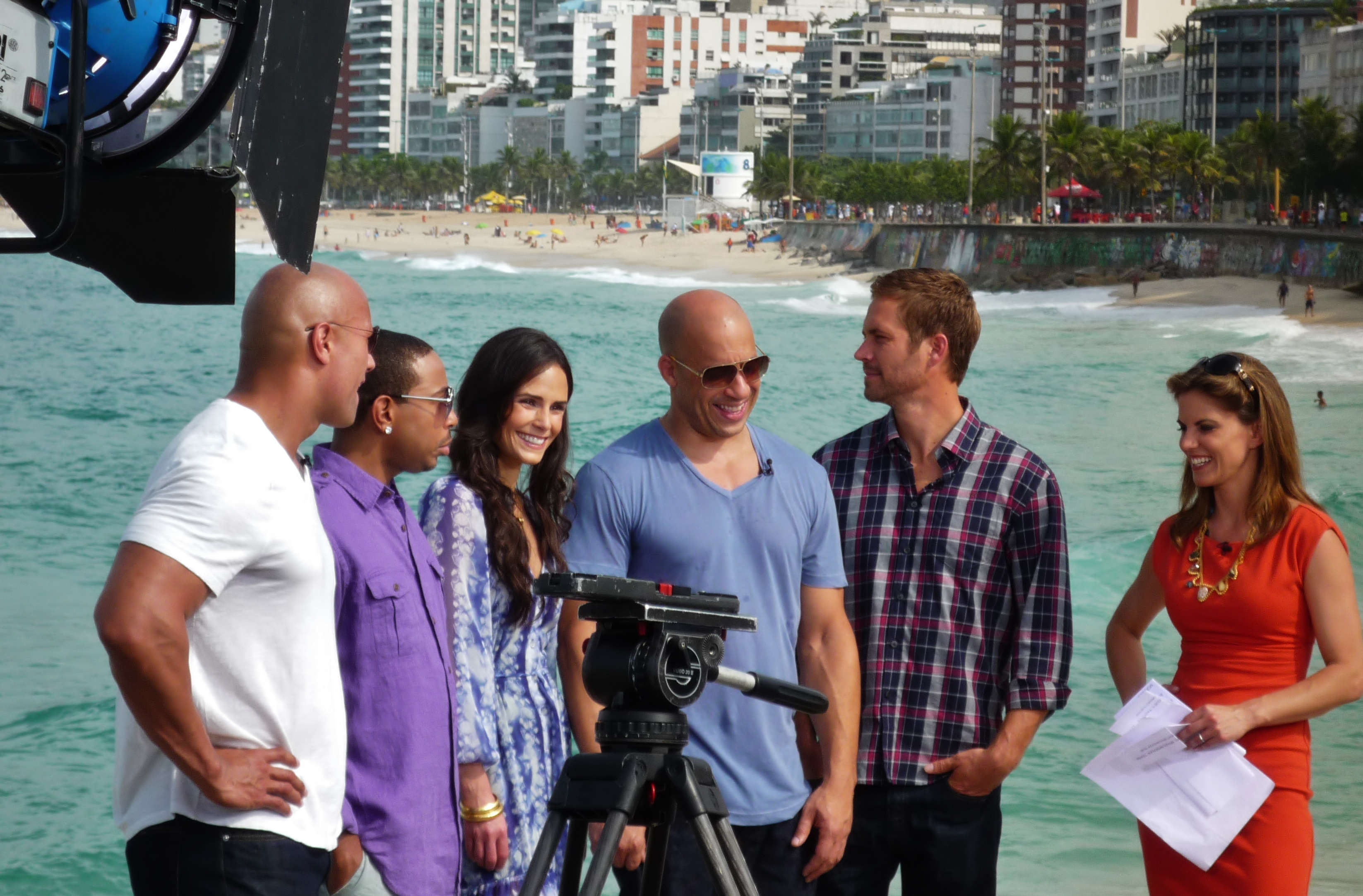
From the first movie-one of Brian O’Conner’s defining images. Image courtesy Paul Walker’s Facebook page.
No matter how much danger and damage covers the screen, death is not supposed to truly consume an action movie. Almost always, the concept of it, of genuine sadness, of legitimate worry, is a mirage. Action flicks toy with it for the sole purpose of exhilarating us with its resounding defeat. And that’s what makes the feelings engendered by Furious 7 so confusing.
It was darn near impossible for me to get a handle on this movie or figure out my feelings for it. At first, the meta-knowledge of Paul Walker’s 2013 death just obliterated everything else. When is his last scene, you keep wondering. Is he going to survive this fight? How is everyone going to say goodbye? And when the poignant ending finally arrived, both later and more effective than I expected, that was it; little else mattered.
After a second viewing, it became clear that other factors contributed to me feeling so nonplussed. How do you balance a reasonable acknowledgment of the difficulties inherent in bringing this movie to life with the flaws that it undeniably possesses? I’m not a robot; I can grant leeway to a movie that loses its star midway through filming, forcing a script rewrite that not only takes him out of climactic scenes he hadn’t yet filmed but also re-jiggers earlier ones to write him out of the story.
But that concession gets tested, at times, by Furious 7’s uneven pacing and jarringly clunky first-act scenes. Ultimately, when you’re watching a movie, should anything but the actual product matter? If not, then why do mitigating circumstances only exist for certain flicks? As much as I want to exonerate 7 for its limitations, that also feels a little like invalidating a championship because the losing team’s star player had the flu. As Ari Gold once reminded us, “There are no asterisks in this life—only scoreboards.”
None of this is to say that Furious 7 is bad; but the seams clearly show. And after defending this series for so long, I now have to take the other side and challenge some of the hype that’s placing this entry alongside #1 and #5 as a series standout.
The transition to a post-Walker life isn’t the only notable one. Indeed, for all the exciting new things we learn about the Furious universe in 2015—Vin Diesel wears sleeves (!?); cars can, in fact, fly; The Rock may not actually have any bone under the muscles in his arm—the biggest change comes with the loss of longtime director Justin Lin. Newcomer James Wan’s noticeably blunter style feels slightly discordant with the rest of the series, his aim uneven and his goals periodically unclear. (Examples: the amateurish feel of scenes like Dom’s hospital visit may be primarily due to the dialogue, but the director has to bear some responsibility; and any justification for the exponential increase in scantily-clad females would be untenable.)
Yet, none of that may ultimately matter, at least as far as this film’s legacy is concerned. Why? Because they nailed Brian O’Conner’s sendoff. Heartwarming, fitting, and well-earned, the coda feels like the only way Brian could have been memorialized, and I can’t pretend that it didn’t get a little dusty in the theater as the credits rolled.

The gang shooting Fast Five in happier times. Image courtesy Wikipedia.
7 picks up shortly after the events of 6, where, if you recall, a Rock-sized runway helped our intrepid heroes ground an airplane, defeat Owen Shaw, and casually brush off the death of Gisele. Aircraft will factor even more heavily in #7, as will the Shaws, as Owen has a brother named Deckard (Jason Statham) who’s now out for blood; meanwhile, Gisele, not that anyone seems to care, is still dead.
Possibly because ‘wait for the villain to find you’ doesn’t give our heroes much to do, 7 adds another subplot surrounding some militaristic mumbo-jumbo and a device that can locate any person on Earth instantly, or something. If Vin and Co. can steal this device, they can find Shaw.
Said goal does at least keep the characters active in pursuit of something—always a positive—but the motivation sounds dumber and dumber the more it’s repeated. We’ve got to get this, so we can get to Shaw…uh, even though Shaw isn’t hiding and actually pops up everywhere we go.
Really, it’s all just padding around the set pieces anyway—and, thankfully, they thrill. Driving cars out the back of a C-130 transport aircraft in order to land on a deserted stretch of highway, hijacking a military bus to grab a computer hacker, and Brian putting everything he has into a death-defying jump onto the spoiler of Letty’s car …I mean, the whole sequence is so spectacular that I want to shake the person who decided that it shouldn’t constitute the climax. I used to think that Vin saving Letty over the bridge in 6 was the series’ defining image, but that’s officially been replaced with this.
The other buzz-worthy sequence involves Vin driving a multi-million dollar sports car in and out of a few skyscrapers in Dubai. (It’d be amazing if the buildings were a quarter-mile apart, but I doubt they are.) Unfortunately, the two and a half hour flick doesn’t only have set-pieces, and too many components here feel …well…go on, say it…a littttle bit off. We waste the imposing talents of both Statham and Rock, the former because he doesn’t really do anything and the latter because he’s propped up in a hospital bed for 80% of the movie. There’s a particularly bizarre scene where Rock calmly allows Statham to hack into his computer…before somehow losing a fight that renders him incapable of doing anything for the next 2 hours.
Several scenes burst out of the gate with verve, only to pull up lame and ask for water. Take the showdown in the underground garage where Vin and Statham play chicken in their cars. Great idea—I’m fully on board with this. But after they ram each other like rhinos, they sort of dick around for a moment, then Kurt Russell and a parade of feds barge in, causing Statham to flee. Russell subsequently sparks Vin’s interest by promising to get him Statham. You mean the guy who was just here? You can help me find him? Awesome! (And why do we have a carbon copy of the chicken dance later? Presenting the same exact scene twice is a cardinal sin in a movie; one easy way that could have been avoided is to have one of the two veer away from the collision during the first encounter.)
Likewise, the climactic sequence is “actually kind of an overcrowded mess.” Set in downtown L.A. in the dark, it neither features anything as cinematically overwhelming as the earlier inflection points nor really fits a F&F movie. Explosions and screams and mayhem pelt the screen, but no real pattern comes of them.
You have to wonder the extent to which the filmmakers were limited by Walker’s death (a late, shadowy fight was undoubtedly filmed with his brother), but the style still invites concern, especially with Wan likely helming the next installment. The overstuffed nature of 7—even the awesome aircraft drop sequence should have been about 20% shorter, with fewer external characters and shorter fights—invokes other generic action movies, and the bravest thing 8 could do would be to scale things back a little, especially if this breathless quest to be more and more ‘epic’ results in such muddy characters (seriously, what is Statham doing in this movie?) and desultory climaxes. There’s a reason no one likes the Pierce Brosnan James Bonds.
[pullquote]The bravest thing 8 could do would be to scale things back a little, especially if this breathless quest to be more and more ‘epic’ results in such muddy characters (seriously, what is Statham doing in this movie?) and desultory climaxes. There’s a reason no one likes the Pierce Brosnan James Bonds.[/pullquote]
The best Fast movies succeeded by introducing us to a world we didn’t know, then providing us with both incredible vehicle-based stunts and these wacky, lovable characters. The series’ hallmarks include heisting a safe through Rio, yes, but also Vin Diesel’s obsessive love for family. Having the balls to reverse out the back of an aircraft carrier, sure, but also Tyrese’s simultaneous arrogance and fear, Walker’s look that makes you always want to trust him, and the way that everyone knows someone else will be there to catch them when they jump.
The great thing is that, by now, the crew feels like family to us. We love them and root for them—which is half the battle for most movies. That’s why we care so much when Vin (in a scene clearly produced and edited after Walker’s death—note how Vin does all the talking) tells his comrade to retire to be there for his family. Other small details feel just as pure: Paul aggressively revving his engines to inch forward in the carpool line while dropping off his son at school; Rock finally joining the party by announcing “Daddy’s gotta go to work”; and Ramsey’s amusing breakdown of the role of each member of the crew.
Unfortunately, the presentation of Ramsey, the computer hacker who’s vital to the crew’s mission, looks awkward now and will age even worse. Inexplicably making her a sex goddess that Ludacris and Tyrese creepily lust after takes this into directions that the series had, on the whole, mercifully avoided.
In its own way, 7 accomplished exactly what it needed to: it provided a few sequences that set a new bar for cinematic creativity, kept fan interest sky-high (have you seen those box office numbers?), and smoothly paved the way for Vin and Rock to carry the torch in the future. When they do, I hope we tone down the female objectification and mindless destruction, get the characters back into cars more often (NOS doesn’t even make an appearance here until the final 15 minutes!), and remember what made this series so popular and so enjoyable in the first place.
Does all this mean Furious 7 isn’t enjoyable? No, but it feels like it never really gets out of its own way. Indeed, the only time it does is in the coda, the effortless grace of which comes out of nowhere. In fact, I wouldn’t be surprised if Walker’s sendoff, and nothing else, remains this movie’s definitive contribution. In the future, when we’re debating the merits of Ten Times as Furious vs. The Fastest Dozen and the Rock’s daughter is fighting baddies with everyone else, I think we’ll look back on 7 simply as ‘the one where they say goodbye to Paul.’ And that’s alright with me.




